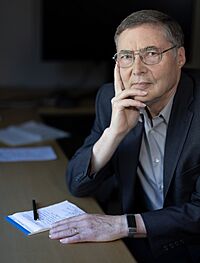Carl Wieman facts for kids
Quick facts for kids
Carl Edwin Wieman
|
|
|---|---|

Wieman in 2024
|
|
| Born | March 26, 1951 Corvallis, Oregon, U.S.
|
| Alma mater | MIT Stanford University |
| Known for | Bose–Einstein condensate |
| Awards |
|
| Scientific career | |
| Fields | Physics |
| Institutions | University of British Columbia University of Colorado Boulder University of Michigan Stanford University |
| Thesis | Polarization Spectroscopy and the Measurement of the Lamb Shift in the Ground State of Hydrogen (1977) |
| Doctoral advisor | Theodor W. Hänsch |
| Doctoral students | Wendy Adams Christopher Monroe |
Carl Edwin Wieman (born March 26, 1951) is an American physicist and educator. He works at Stanford University and is also a professor at Cornell University. In 1995, while at the University of Colorado Boulder, he and Eric Allin Cornell created the first true Bose–Einstein condensate (BEC). For this important discovery, they shared the Nobel Prize in Physics in 2001 with Wolfgang Ketterle.
Wieman is also a professor in the Stanford Graduate School of Education. He received the Yidan Prize in Education Research in 2020. This award recognized his work in creating new ways to teach science, technology, engineering, and math (STEM).
About Carl Wieman
Carl Wieman was born in Corvallis, Oregon, in the United States. He went to Corvallis High School. He earned his first degree from MIT in 1973. Later, he received his Ph.D. from Stanford University in 1977.
In 2001, he won the Nobel Prize in Physics. He shared this prize with Eric Allin Cornell and Wolfgang Ketterle. They were honored for their basic studies of the Bose-Einstein condensate. This is a special state of matter that happens at very cold temperatures. In 2004, he was named the United States Professor of the Year among all universities that offer doctoral degrees.
Wieman has shared stories about his youth and how he became a physicist. He often talks about how his teachers and parents helped him. He also discusses his journey into science education and how he started PhET Interactive Simulations.
Making Science Education Better
Carl Wieman has spent many years working to improve science education. He has done research on how science is taught. From 2005 to 2009, he led the Board on Science Education for the National Academy of Sciences.
He uses and supports a teaching method called peer instruction. In this method, teachers ask multiple-choice questions during class. Students answer right away using small devices. If many students choose the wrong answer, they talk about it with each other. Then, they answer again. This helps students learn from each other. In 2007, Wieman received the Oersted Medal. This award recognizes important contributions to teaching physics.
Wieman is the founder of PhET. This is a website from the University of Colorado Boulder. PhET offers many free online simulations. These tools help students learn physics, chemistry, biology, earth science, and math in a fun way.
Wieman was also involved with the USA Science and Engineering Festival. He served as an Associate Director of Science for The White House's Office of Science and Technology Policy. He held this position from 2010 to 2012.
Selected Publications
- Wieman, Carl, (2014). "Stop Lecturing Me", Scientific American, July 15, 2014.
See also
 In Spanish: Carl E. Wieman para niños
In Spanish: Carl E. Wieman para niños
 | Precious Adams |
 | Lauren Anderson |
 | Janet Collins |

